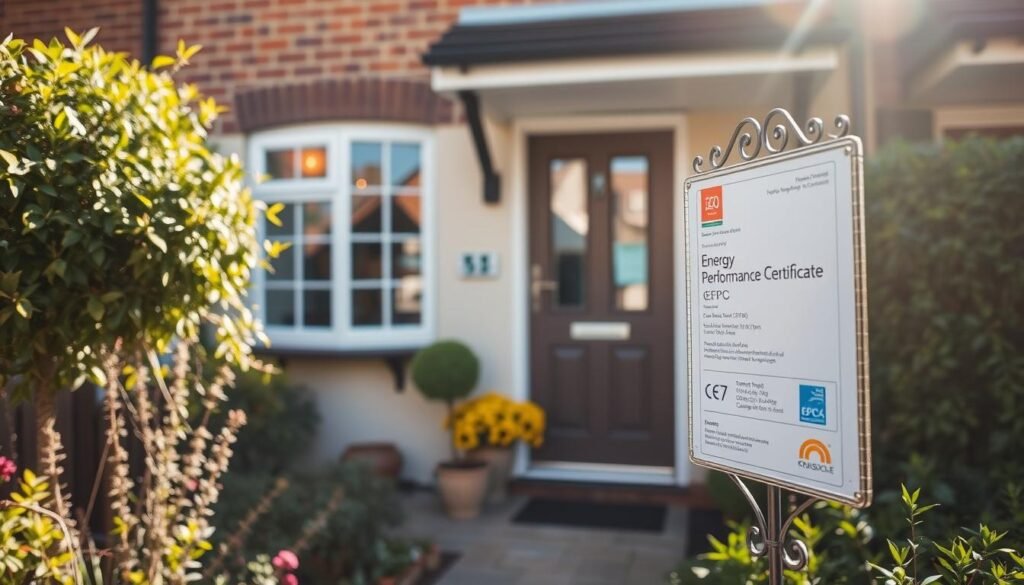As a landlord, you might wonder if you need a new Energy Performance Certificate (EPC) when renewing a tenancy. This question can be tricky because EPC rules are complex. We’ll look into EPC renewals and when you might need a new one.
Key Takeaways
- Landlords don’t usually need to get a new EPC just because the old one has expired. This is true if they don’t plan to rent or sell the property.
- But, it’s a legal must to give tenants a valid EPC when they move in. This helps avoid fines.
- Renewing tenancy agreements might mean giving tenants a valid EPC. This is a smart move to keep up with the law and avoid arguments.
- Improving a property’s energy efficiency can save money for both landlords and tenants.
- It’s key for landlords to know the EPC renewal rules. This helps them stay legal and avoid fines.
Understanding Energy Performance Certificates (EPCs) in Property Lettings
An Energy Performance Certificate (EPC) is key. It shows how well a property uses energy and its carbon emissions. The UK government made it law to help the environment and save energy.
What is an EPC and Its Purpose
An EPC is a detailed report by an energy expert. It looks at the property’s age, build, heating, and lights. It gives a rating from A (best) to G (worst) and tips to use less energy.
Legal Requirements for EPCs in the UK
In the UK, landlords must show an EPC before renting. This rule covers all new buildings, sales, and rentals. Since April 2018, rentals need at least an EPC rating of E.
How long does an EPC last?
An EPC is good for 10 years, no matter what happens with the property. Landlords need a new one every decade to keep up with energy laws.
Do I Need to Provide a New EPC if I Renew an Existing Tenancy
Renewing a tenancy agreement doesn’t always mean you need a new Energy Performance Certificate (EPC). The Energy Performance of Buildings (England and Wales) Regulations 2012 state that an EPC must be given to a new tenant early on. But, if the tenant doesn’t change, you might not need a new one.
However, if the EPC details change, like a new boiler, you should get a new one. This is important for the tenant to know. It’s also good to give a valid EPC when renewing tenancies to follow the rules and avoid legal issues.
Remember, an EPC is good for ten years. Since 2007, it’s been a rule. The Minimum Energy Efficiency Standards (MEES) Regulations, from 2015, have rules for homes and businesses. Breaking these can lead to big fines.
| Penalty | Amount | Details |
|---|---|---|
| Fixed Penalty | 12.5% of the building’s rateable value | For not issuing a valid EPC to new tenants |
| Penalty | £750 | For failing to provide a valid EPC upon new tenancy agreement |
| Maximum Penalty Cap | £5,000 | For breaching EPC regulations |
| Additional Fine | £200 | For continual failure to provide EPC to enforcement officers |
By 2025, all new tenancies must have an EPC rating of at least band C. By 2028, all rental properties must also meet this standard. Landlords need to keep up with these rules to avoid big fines.
In summary, while you might not always need a new EPC for an existing tenancy, it’s wise to do so. This ensures you follow the rules and avoid legal trouble. Also, be aware of any changes that could affect your EPC rating and the MEES Regulations deadlines to keep your property energy-efficient and avoid fines.
Current EPC Regulations for Landlords in the UK
Since 2008, all rented properties in the UK need an Energy Performance Certificate (EPC). Landlords must keep their properties’ EPC ratings at ‘E’ or higher. Not doing so can lead to big fines.
Minimum Energy Efficiency Standards (MEES)
The MEES rules, starting in 2018, say all rental homes in England and Wales must have an EPC of ‘E’ or better. From April 2020, this rule applies to all existing tenancies. Landlords can’t let homes with lower EPC ratings unless they have a valid reason.
Penalties for Non-Compliance
Landlords who don’t have a valid EPC or let homes with low EPC ratings face big fines. They could get a fine of 12.5% of the property’s value, with a minimum of £750. If they keep breaking the rules, they’ll get extra £200 fines. The biggest fine is £5,000 per property.
To follow the rules, landlords should check their EPC ratings often. They should make energy-saving changes if needed. There are grants and schemes, like ECO and the Great British Insulation Scheme, to help improve properties.
When Does an EPC Need to Be Renewed?
In the United Kingdom, landlords must have an Energy Performance Certificate (EPC) for rented or sold properties. This certificate shows a property’s energy efficiency and suggests ways to improve it. Many landlords wonder when they need to renew their EPC.
An EPC is valid for 10 years. So, if you have a current EPC, you don’t need a new one until 10 years pass. But, there are times when you might need a new EPC before the 10 years are up.
- Significant property modifications: If you’ve made big changes to your property, like a new heating system, you’ll need a new EPC before renting it out.
- Tenancy renewals: Renewing a tenancy doesn’t always mean you need a new EPC. You’re okay if the current one is still valid. But, if the EPC has expired or if you’ve made big changes, you’ll need a new one.
The government once planned to make EPCs stricter. They wanted a minimum rating of C by 2025 for new tenancies and 2028 for all rentals. But, they dropped these plans in September 2023. Still, having a valid EPC is a must, and not having one can lead to fines.
| Scenario | EPC Renewal Requirement |
|---|---|
| New tenancy agreement | New EPC required |
| Existing tenancy renewal | New EPC only required if current EPC has expired or property has been significantly modified |
| Significant property modifications | New EPC required |
Knowing when to renew an EPC helps landlords follow the rules and avoid fines. Regular checks can also show where improvements can be made. This can save money and make your property more energy-efficient.
Circumstances Requiring a New EPC During Tenancy Renewal
When you renew a tenancy, you might need a new Energy Performance Certificate (EPC). This is true if you’ve made big changes to the property. Or if new building rules have changed what’s needed for energy efficiency.
Property Modifications and Their Impact
Big changes like a new boiler or better insulation can really change how much energy a property uses. If you’ve made these kinds of changes, you might need a new EPC. This is to show how efficient the property is now.
Changes in Building Regulations
New rules on energy efficiency can also mean you need a new EPC. If the rules have changed, your property might not meet them anymore. You need to make sure your property is up to date with the energy efficiency improvements and building regulations for the tenancy renewal process.
It’s important for landlords to keep up with changes in their property and the rules. This way, they can make sure their homes are energy-efficient. And they can keep up with the law.

Cost Implications of EPC Renewal for Landlords
Renewing an Energy Performance Certificate (EPC) can be costly for landlords in the UK. The price of an EPC assessment varies, usually between £60 to £120. But, there are more costs to consider.
If a property doesn’t meet today’s energy standards, landlords might need to spend on energy efficiency upgrades. These could be better insulation, efficient heating, or renewable energy. Getting a ‘C’ EPC rating can cost about £4,700, with a cap of £10,000 for upgrades.
The EPC assessment fees and landlord expenses for these upgrades are high. Yet, they can save money on energy bills and increase property value. Landlords can get up to £5,000 from the Green Homes Grant to help with these costs.
Landlords should think about the costs of EPC renewal when managing their properties. Investing in energy upgrades meets legal needs and boosts property value and sustainability.
My EPC has expired. When should I get a new one?
If your Energy Performance Certificate (EPC) has expired, you don’t need to get a new one right away. But, it’s smart to plan for a new EPC well before it’s due. This way, you’ll meet the rules and avoid any problems when you want to rent out your property or sell it.
In the UK, an EPC is good for 10 years. From April 2018, all properties must have a good energy rating. By 2025, they need to be at least C-rated to meet new rules.
Not following these rules could cost you up to £30,000 from 2025. You might also need to spend more on making your property energy-efficient. So, keeping your EPC up to date is very important.
Renewing your EPC on time helps you avoid any issues. It shows you’re serious about following the law and caring for the environment. This is great for your property’s value in today’s market.
How to Check if Your Current EPC is Still Valid
It’s vital for landlords and property owners in the UK to keep their Energy Performance Certificate (EPC) up-to-date. An EPC shows a building’s energy use and carbon emissions. It’s valid for 10 years, but you should check it often to follow the rules.
Using the EPC Register
To see if your EPC is still good, use the EPC register online. You can find your property’s EPC by its postcode or report number. The expiry date is easy to spot on the certificate.
Understanding EPC Expiry Dates
An EPC is valid for 10 years from when it was issued. It’s key to remember this date to avoid fines. If your EPC is about to expire, get a new one done before it’s too late.
Checking your EPC regularly and renewing it helps you follow the law. It also means your property could use less energy, helping you and your tenants.

Benefits of Updating Your EPC Even When Not Required
Updating your Energy Performance Certificate (EPC) has many benefits, even if you don’t have to. It can show where your property can use less energy. This means lower bills for your tenants and a higher property value.
An improved EPC rating makes your property more appealing. It could attract higher rents or sale prices. This is because people want to save on energy costs.
The Ministry for Housing, Communities and Local Government says you don’t always need an EPC for lease renewals. The 2007 EPC Regulations require one when a lease is first granted. This helps potential tenants understand the property’s energy use.
The 2015 MEES Regulations for non-domestic properties require a new EPC for re-letting or significant changes. For homes, the 2019 MEES Regulations say you need a new EPC for re-marketing or after big changes.
Even without legal need, updating your EPC brings benefits. It can spot ways to use less energy. This could lower your tenants’ bills and boost your property’s value.
An improved EPC rating also makes your property more appealing. It could attract higher rents or sale prices. This is because people want to save on energy costs.
| Benefit | Description |
|---|---|
| Energy Efficiency Improvements | An updated EPC can highlight areas where energy efficiency can be improved, leading to reduced energy consumption and lower utility bills for your tenants. |
| Reduced Energy Bills | By implementing the recommended energy efficiency measures, your tenants can enjoy lower energy bills, making your property more attractive to potential renters. |
| Increased Property Value | A property with a high EPC rating is generally more valuable, as it demonstrates energy efficiency and lower ongoing costs for the owner or occupier. |
Updating your EPC proactively makes your property stand out. It shows it’s energy-efficient and cost-effective. This can increase demand, lead to higher rents, and make your property more valuable over time.
Common Misconceptions About EPC Renewals
Many landlords have misconceptions about Energy Performance Certificates (EPCs) and their renewals. Knowing these myths can help landlords save money and follow energy efficiency regulations correctly.
One myth is that EPCs must be renewed every year. But, an EPC is valid for 10 years. Unless the property has changed a lot, a new EPC isn’t needed.
Some think EPCs are only for short-term tenants. But, landlord responsibilities include giving a valid EPC to all new and renewing tenants. This shows the property’s energy efficiency, clearing up EPC myths about long-term tenancies.
It’s also thought that small improvements, like new windows or insulation, always mean a new EPC. But, only big changes need a new assessment. Small upgrades don’t always require a new EPC.
By clearing up these misconceptions, landlords can follow energy efficiency regulations better. This helps them avoid extra costs and penalties.
It’s key for landlords to know the truth about EPC renewals to stay compliant. This knowledge helps avoid fines and legal issues. By understanding these EPC myths, landlords can manage their properties well and ensure a smooth rental process.
Tips for Maintaining a Valid EPC Certificate
As a property landlord, it’s vital to keep your Energy Performance Certificate (EPC) up to date. This ensures you follow the law and give potential tenants the right info about your property’s energy use. Here are some useful tips to help you manage your EPC documents well:
Record Keeping Best Practices
Keeping good records is essential for a valid EPC. Landlords should note down the assessment date, any energy improvements, and other important details. It’s a good idea to keep digital copies of these documents for easy access.
I Have Lost My EPC. Where Can I Find a Replacement?
If you’ve lost your EPC, you can get a new one from the EPC Register. This database has all EPCs from the UK. It’s a great place to find a copy of your certificate.
Working with Accredited Assessors
When it’s time to renew your EPC, use accredited energy assessors. They are trained to do detailed assessments. This ensures your property’s energy efficiency is correctly shown in the EPC. Working with them helps keep your EPC valid and reliable for your property records.
By following these tips, you can manage your EPC documents well. This helps you meet legal standards and gives potential tenants the right info about your property’s energy use. Being proactive and working with experts makes the EPC process easier.
Conclusion
In the UK, landlords must keep up with Energy Performance Certificates (EPCs) rules. Even if there are exceptions, knowing the latest EPC compliance, landlord responsibilities, and energy efficiency standards is key. This helps avoid legal trouble and ensures properties are energy-efficient.
Checking a property’s energy use regularly and renewing EPCs on time is important. It helps landlords avoid fines and makes properties more attractive to tenants. By meeting EPC obligations, landlords show they care about their properties and the environment.
Understanding EPC rules might seem hard, but landlords who stay informed can make better choices. They can keep their properties legal and help create a greener rental market. This benefits both landlords and tenants, making the rental market more sustainable.
FAQ
What is an EPC and its purpose?
What are the legal requirements for EPCs in the UK?
How long does an EPC last?
Do I need to provide a new EPC if I renew an existing tenancy?
What are the Minimum Energy Efficiency Standards (MEES) for landlords in the UK?
What are the penalties for non-compliance with EPC regulations?
Do I need an EPC for a House in Multiple Occupation (HMO)?
When does an EPC need to be renewed?
What circumstances require a new EPC during tenancy renewal?
How much does it cost to renew an EPC?
When should I get a new EPC if my current one has expired?
How can I check if my current EPC is still valid?
What are the benefits of updating my EPC even when not required?
What are some common misconceptions about EPC renewals?
How can I maintain a valid EPC certificate?




